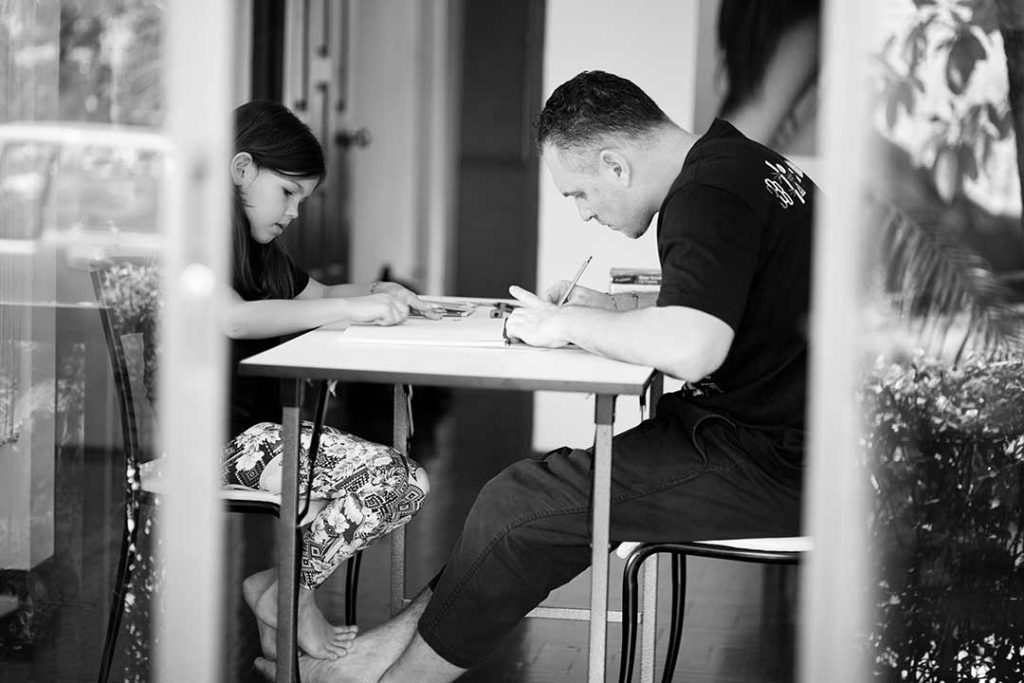
Those of us lucky enough to homeschool in New York State (yes, my tongue is firmly in cheek!) sometimes look at the homeschooling laws and feel slight panic set in. Before anyone jumps on me about complaining that New York has rules and regulations and says that obviously I want to skate by on the responsibility of educating my children, let me explain. New York has a lot of laws for homeschoolers and is considered one of the strictest states to live in for homeschooling regulations. I want to go on record and say that I think homeschooling laws are good in most ways. They keep parents accountable, hopefully avoiding educational neglect and ensuring that kids learn what they need to. They can also be helpful if you run into problems with your district. Everything you’re required to do is spelled out, so you can simply point to the law and show you adhere to it. I never had trouble with my district in my 21 years, but I always figured if I did, I’d be prepared.
I’m no longer homeschooling, so I find myself in the role of an old wise woman. I answer people’s questions and reassure them that yes, they can do this, and yes, their kids will learn things and be happy, and that they may even wonder why they worried about anything in the first place once all is said and done. I get a lot of questions about subjects and the number of hours each subject needs to be taught.
The early grades are easy because the district simply lays out which subjects to teach, which are pretty straightforward. Any parent that decides to homeschool probably already knows their children need to learn to read, write, spell, to do basic arithmetic functions, learn about our country and things like maps and globes, environments and habitats, animals and plants, the weather, etc. Families with kids this age naturally do physical education and art projects without thinking of them as school because…kids. Kids learn about holidays and traditions just from life and talking with their parents, and “subjects” like bike, water and fire safety are things parents everywhere want their kids to know about.
Then your child gets to middle school, and all of a sudden, the law requires parents to teach English, history, math and science for 216 hours each, per school year. They toss in 54 hours each of art and music, and tell you to do physical education, health education, practical education (hint: that means life skills. You get to call household chores, cooking, dishes, laundry and grocery shopping life skills, and get away with it!) and library skills regularly.
That seems like a lot of hours! How can I fit all that in? Do I have to keep track of 45 minutes spent here and 53 minutes spent there, till we reach that magic number, 216 hours? And then when we reach it, are we finished with math for the school year?
My mantra is: don’t worry about it! All you need to do is remember that the way they came up with the requirements is based on the public school day. And by that, I mean 5.5 hours each day (note that kids are actually IN school a lot longer than that each day–it shows you how much wasted time they spend there!) for 180 school days, which is the homeschool requirement of 990 total hours for grades 7-12. I can tell you that with four children, three of whom I homeschooled K-12 and my youngest K-8, I never once worried about the number of hours we did per day.
Why? Wasn’t I worried about the district? What if someone reported me? What if my kids didn’t learn enough? Didn’t I track hours?
The answer to all of that is no. Just no.
The simplest thing I can tell you is that if you plan your school year, whether it’s by buying a boxed curriculum by grade, enrolling in an online homeschool course or cobbling together each subject by workbooks, texts, unit studies, films, documentaries and reading, and your child goes through and completes a large portion of that work…you have already met your requirements.
Add in various classes they can take through the library or community centers, homeschool clubs and co-op lessons, extracurriculars like Scouts and 4H, sports, lessons in music, art, theater, dance or gymnastics, performances of any kind, field trips of one thousand varieties, cooking at home, gardening, doing household chores, raising pets, playing creative games, getting a part-time job or apprenticeship when they’re teens, following passions, reading for fun….and I would argue that your children will actually be learning far more than they’d ever have time for with a regular school schedule. Those hours are a simple guideline that you will continuously demolish as you homeschool and make learning an integral part of your family life.
An interesting note about high school homeschooling hours: math and science are once again listed as 216 hours per school year…..but if your child goes to public school, they are not required to take math and science every year! In New York State, children must take three math and three science courses and pass a Regents exam….and some 8th graders take the Algebra 1 Regents, which means technically they can drop math in junior year if they have a mind to. They also list physical education at 216 hours per school year, but my daughter doesn’t have gym every day. At her school, they use an A and B day schedule, so gym alternates days with a science lab, or in some cases, something like chorus or art. And “electives” are listed at a whopping 324 hours per year.
That may seem like a crazy number of hours, but when you consider how many classes it can encompass, you can rest assured that you can find subjects your homeschooled teens will love under the heading electives. My eldest daughter wanted to delve into psychology, criminology, sociology and photography, so her electives tended toward more traditional schoolwork. My middle two daughters are artists, so their electives were geared towards drawing, painting, needle felting, knitting and crochet, creative writing, learning to play piano, ukelele and guitar. My son is a classical violinist, so all the hours he spent practicing, the music school he went to in the city and his private lessons more than covered those 324 hours. In addition, my family did community theater together, both on stage and off–directing, stage managing, running lights and sound, stage crew, producing and helping on sets and props for many, many shows. That’s definitely a great elective!
My advice for homeschoolers is to relax and explore every interest your children have. Live life and remember that in the end, practically everything you do can be counted towards education. Get out in your community, participate in classes your library offers, explore the natural world, volunteer for causes you love. Read endlessly. Explore world cuisine and cook new dishes together. Use nuggets of information to springboard your way to learning new things, and I promise, you won’t regret homeschooling.
You might just wonder what took you so long to find it.

JENNIFER EAGER is a freelance writer living on the eastern end of Long Island. After homeschooling her four kids for over 20 years, she’s pretty happy with the way they turned out and is excited to see what the next chapter brings. She’s been married to her best friend for nearly three decades and loves music, reading, cooking and collecting pets. Her most beloved hobby is performing in community theater productions, and she is known for dragging her husband into every show in some capacity. Right now she’s writing from home, but hopes someday to lead the life of a writing nomad, traveling the world and writing in Parisian cafés, tropical beaches and medieval castles.





